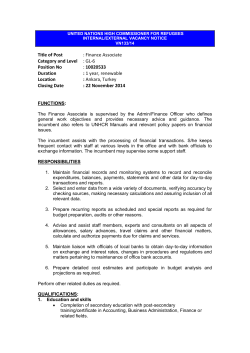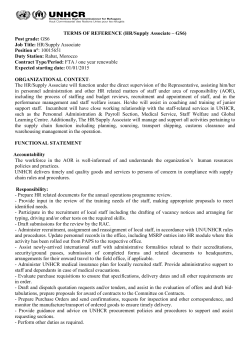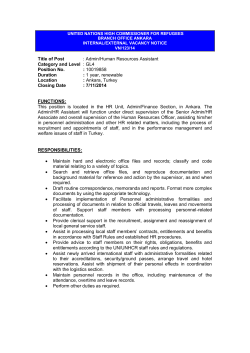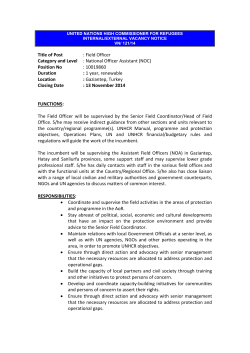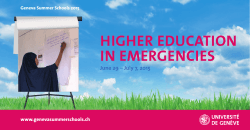
UNHCR Operational Update #13
UKRAINE SITUATION UNHCR OPERATIONAL UPDATE 1 – 21 May 2015 HIGHLIGHTS KEY FIGURES 1,283,700 registered Internally Displaced People (IDPs) comprising: 770,400 pensioners 298,100 working age 161,200 Situational overview: The overall security situation is critical. Fighting has steadily intensified during the reporting period. Continued diplomatic efforts are underway towards a political solution to the conflict. Protection concerns: In the context of the ongoing fighting, freedom of movement remains a key concern. Legislation update: Draft law no. 2166 on the Introduction of Amendments to Certain Legislative Acts of Ukraine to strengthen the guarantees of the rights and freedoms of IDPs was adopted in the first reading by Parliament. Assistance provided: Since 30 April UNHCR provided non-food items (NFIs) to 6,300 people in non-government controlled areas. UNHCR delivered a further 300 NFI sets to people in government controlled areas. The implementing partner People in Need distributed UNHCR shelter material to 22 households. children 54,000 disabled Source: Ministry of Social Policy, Ukraine FUNDING USD 41.5 million requested for the operation in 2015 Funded 40% Gap 60% PRIORITIES As part of the UN Humanitarian Response Plan, to lead protection, shelter and NFI clusters to help those forcibly displaced from their homes. Support Government in efforts to establish a central authority to deal with IDPs. Work with the Government to improve registration system, specifically procedures relating to pensioners and access to social assistance. Promote freedom of movement and humanitarian access. “I want my daughter to have a home.” Carrying baby Viktoria, Yulia, 25 and her husband fled their home in Zolote, Luhansk region, last August to escape nearby fighting. Following the recent ceasefire, the family decided to return home to their village. They found buildings destroyed, schools deserted and the coal mine in which Viktoria's dad had worked, closed. UNHCR has provided non-food items to Yulia's family and others who have returned to the village. Photo: UNHCR Ukraine/ Mario Pavlovic 1 UNHCR Operational Update-Ukraine UPDATE ON ACHIEVEMENTS Operational Context Against the backdrop of the 9 May Victory Day holiday the situation on the ground has remained critical, characterized by a worsening conflict situation and a steady increase in the number of ceasefire violations. Fighting has intensified, with the heaviest fighting taking place to the north and west of Donetsk city, north and west of Luhansk city and north and east of Mariupol. The overall security situation remains extremely tense with reduced reports of people returning to the conflict area. Diplomatic efforts have continued, with a meeting of the Trilateral Contact Group, consisting of senior representatives of Ukraine, the Russian Federation and the OSCE Chairperson-in-Office taking place in Minsk on 6 May. This was the first meeting to take place since the 12 February ceasefire. As of 13 May there were 1,283,700 IDPs registered by the Ministry of Social Policy, representing an increase of 28,000 since 27 April. The comparatively low number of new registrations was mainly due to the Labour Day and Victory Day holiday period rather than any improvement of conditions in the conflict area. Following the high number of movements in and out of non-government controlled areas reported over the Easter holidays, the number of reported movements has reduced, particularly returns. IDPs suffer from the lack of employment opportunities. Costs, particularly of food have increased by 3-4 times since November 2014. Basic staple items cost approximately twice as much as in government controlled areas. Those that do return do so mostly to look after family who cannot leave and to maintain property. IDPs have developed various means of coping with the situation such as sending individual family members back to the conflict area to oversee property. There have also been reports of families remaining in non-government controlled areas sending the breadwinner abroad to find work and send money back. IDPs are currently accommodated in three types of accommodation: collective centres, with host families or volunteers and privately rented accommodation. The vast majority of IDPs live with host families. Due to the unexpected longevity of the conflict situation, it seems most likely that secondary displacement will occur as IDPs seek more sustainable solutions. A decree restricting traffic across the line of contact to certain classes of vehicles was implemented on 1 May. UNHCR observed long queues of trucks including food shipments at certain checkpoints. UNHCR is following the situation closely. External Displacement UNHCR continues to monitor the refugee situation in neighbouring countries. According to government sources in receiving countries, the total number of people seeking asylum or other forms of legal stay in neighbouring countries Achievements now stands at 845,800, with the majority going to the Russian Federation (699,400) and Belarus (81,070). 1 Mission monitoring the Gukovo and Donetsk checkpoints on the Russia-Ukraine border inform TheProtection OSCE Observer that the situation continues to remain calm. The trend of increased returns to Ukraine, which has been observed Protection Cluster of the 12 February ceasefire, has continued. since the signing Data sources: Respective national asylum authorities 1 International Protection Considerations Related to the Developments in Ukraine – Update II www.refworld.org/docid/54c639474.html United Nations High Commissioner for Refugees (UNHCR) – www.unhcr.org 2 UNHCR Operational Update-Ukraine The Protection Cluster co-led by UNHCR and OHCHR is currently working on inter-agency contingency planning led by OCHA. Protection partners have analyzed the potential protection risks for several population groups (IDPs, host communities along the line of contact and civilians trapped in the conflict area) highlighting the need to have a differentiated approach in government controlled areas and non-government controlled areas, as humanitarian access will most likely be more limited in the latter. The Protection Cluster coordinators from UNHCR and OHCHR conducted a mission to Kharkiv and Dnipropetrovsk from 5 to 8 May. The purpose was to present the work of the cluster at the local level. Achievements, Impact and Identified Needs Following extensive advocacy by UNHCR, the implementing partner the Right to Protection and civil society, the draft law no. 2166 on the Introduction of Amendments to Certain Legislative Acts of Ukraine to strengthen the guarantees of the rights and freedoms of IDPs was adopted for first reading by Parliament on 19 May. The draft law includes the following amendments: the IDP definition now includes stateless individuals and foreigners with permanent residence; documentary evidence required for IDP registration now includes documents attesting previous residency in the place of origin. It will take 15 working days to process applications from IDPs without passports and residency permits; registration of current residential addresses with the State Migration Service is no longer required; there are improvements regarding registration of IDPs with unemployment agencies; the draft law provides for unilateral termination of previous employment contracts. The IDP certificate now has unlimited validity; return shall be voluntary; IDPs have a right to family unity and to obtain information on missing relatives. Following the entry into force of Council of Ministers Resolution no. 212 on 23 April, extending financial support to IDPs under Resolution no. Some Field Offices reported a lack of information on the process as the primary concern among IDPs. Lack of information and inconsistencies regarding the practical implementation of Resolution no. 79 on the verification of IDP addresses has been a common complaint among IDPs. On 7 May, Council of Ministers Order no. 428-r on settlements within the conflict area came into force, amending Order 1085-r of 7 November 2014. Instead of a list of settlements where the Ukrainian state either temporarily does not have control (i.e. non-government controlled areas) or has only partial control (i.e. the line of contact), the following lists have been created: a) A list of settlements in territory where the state temporarily does not implement its power including 108 settlements, in addition to the settlements of Amvrosiivka, Starobesheve and Shakhtarsk districts in Donetsk region; and Antratsyt, Krasnodon, Lutuhyne, Perevalsk, Slovyanoserbsk, Sverdlovsk districts in Luhansk region. b) A list of settlements located on the line of contact comprising of 62 settlements. On 13 May, a UNHCR Participatory Assessment community event took place in Sievierodonetsk, where Participatory Assessment workshop findings were presented and discussed. The event was attended by over 50 people, including the Deputy Governor of Luhansk region, partner organizations, and 30 IDPs. The same day, a similar event took place in Donetsk city. Participatory Assessment with IDPs is aimed at gathering accurate information on specific protection risks faced by IDPs, underlying causes and hearing their proposed solutions. The results will influence the protection and solutions strategy for eastern Ukraine. Preliminary Participatory Assessment reports from Sievierodonetsk, Dnipropetrovsk and Kharkiv have been shared with key partners and the preliminary Participatory Assessment report for Donetsk is currently being finalized. UNHCR Kyiv began the Participatory Assessment process in Kyiv region with a planning workshop on 14-15 May attended by 45 participants from local authorities and humanitarian organizations who identified key themes and protection issues. The Participatory Assessment process for Mariupol will begin on 1 June. UNHCR implementing partner, Crimea SOS continue to provide protection information, legal assistance and counseling to IDPs in Kyiv, central and western regions. Main issues addressed by the IDPs during the consultations are related to the issues of extension of IDP certificates, movement across the checkpoints in the conflict area and the administrative border with Crimea. United Nations High Commissioner for Refugees (UNHCR) – www.unhcr.org 3 UNHCR Operational Update-Ukraine Shelter and Non Food Items (NFIs) Emergency Shelter and NFIs Cluster The Shelter and NFI Cluster led by UNHCR has released a factsheet focusing on major needs and assistance delivered. The Shelter and NFI Cluster is currently carrying out a contingency planning exercise as part of an inter-agency response plan led by OCHA out of which a Cluster operational plan will be developed. Complementary to this, the Cluster maintains a list of partner’s warehouses, stock and contact details as a preparedness measure. Shelter Cluster partner REACH is beginning a door to door survey targeting 2,800 respondents in Donetsk, Kuhansk, Dnipropetrosk, Kharkiv and Zaporizhzhia regions. This survey will consolidate the information with a baseline used for shelter, NFI and also cash assistance. It will be the largest such door to door one time survey so far undertaken in the context of the Ukraine situation. “It was a nightmare. They landed here and there,” Larisa from Slovyansk shows her backyard. One of the shells hit her house directly, leaving a hole in the wall roughly the height of a person. “It happened last summer right on the Christian Orthodox Holy Trinity holiday. We are still living with our friends. But as soon as we have the roof repaired, we will return home”. UNHCR operational partner People in Need distributed shelter materials to 22 households in Slovyansk, Kramatorsk and Zakitne in Donetsk region. Photo: People in Need/Roman Lunin Achievements, Impact and Identified Needs During the reporting period, UNHCR has provided NFI and shelter assistance to over 6,600 beneficiaries. In government controlled areas, UHNCR distributed emergency kits (a blanket, sleeping bag, bed linen, towel sets, hygiene kits, food, jerry can and a bucket) to 300 people in Zolote village, on the Luhansk sector of the line of contact. UNHCR also provided shelter materials to Norwegian Refugee Council (NRC) for emergency repairs in the same village. Implementing partner People in Need (PiN) distributed UNHCR shelter material to 22 households in Slovyansk, Kramatorsk and Zakitne in Donetsk region. In non-government controlled areas, Luhansk Red Cross distributed 4,000 blankets, 1,750 jackets and emergency shelter material (plastic sheeting and tarpaulins) provided by UNHCR to 4,000 beneficiaries in Luhansk city and the nearby villages of Krasnodon, Novosvitlivka, Khryashchuvate, Lutuhyne, Alchevsk. Two trucks carrying 26.8 tonnes of UNHCR NFIs (kitchen sets, blankets, plastic sheeting and buckets) for distribution in northern Donetsk arrived in Donetsk city on 7 May with subsequent distributions to 2,300 beneficiaries. United Nations High Commissioner for Refugees (UNHCR) – www.unhcr.org 4 UNHCR Operational Update-Ukraine Working in partnership The humanitarian response to the internal displacement situation in Ukraine is a coordinated effort by international organizations, the Government, local and international NGOs. Key Shelter and Non Food Items Cluster partners: Adventist Development and Relief Agency | Caritas Ukraine | Chesna i Svyata Kraina | Crimea SOS | Danish Refugee Council | Donbas reconstruction and development agency | Dopomoga Dnipra | HIA Hungary | IOM | Mercy Corps | Ministry of Regional Development, Construction and Communal Living | Ministry of Social Policy | Norwegian Refugee Council | People in Need | Save the Children UK | Save Ukraine Organization | State Emergency Service | Ukrainian Red Cross Society | UNDP | Vostok SOS | World Jewish Relief Key Protection Cluster partners: Danish Refugee Council | Crimea SOS | Crimean Diaspora | ICRC | IOM | Norwegian Refugee Council | OCHA | OHCHR (HRMMU) | OSCE | State Migration Service of Ukraine | The Right to Protection | The Ukrainian Parliament Commissioner for Human Rights | Ukrainian Helsinki Human Rights Union | UNICEF | UNDP | UNFPA | Vostok SOS FINANCIAL INFORMATION UNHCR is very grateful for the financial support provided by donors, particularly those who have already indicated a contribution to UNHCR’s 2015 activities with un-earmarked and broadly earmarked funds. UNHCR’s total financial requirement in 2015 for the Ukraine situation is US$ 41.5 million, as presented in the Supplementary Appeal. This covers UNHCR’s financial needs for providing protection and assistance to those displaced by the conflict inside Ukraine, as well as those externally displaced in Belarus and the Republic of Moldova. Contributions recorded so far represented 36 per cent of the total financial requirements. Donors who have contributed: Funding (in million USD) A total of Canada Denmark Estonia European Union Finland Germany Greece Italy Private Donors Sweden United States of America 16.7 million has been contributed Funded Situation level Ukraine Gap Total Requested 10.4 6.3 0.4 Rep. of Moldova 0.0 0.2 Belarus 0.0 0.4 Regional Costs 0.0 0.4 United Nations High Commissioner for Refugees (UNHCR) – www.unhcr.org 5 UNHCR Operational Update-Ukraine United Nations High Commissioner for Refugees (UNHCR) – www.unhcr.org 6
© Copyright 2025
